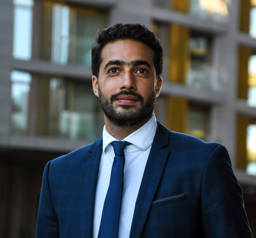Lebanon
Scenarios for UNRWA and the way forward. New report out
A CMI report co-authored by PRIO researcher Jørgen Jensehaugen takes stock of the UNRWA, its role and way forward in context of a funding crisis.
Abraham Accords on NRK Urix
Før måtte de skjule at de var jøder i arabiske land.
Security Force Assistance to Fragile States
Security Force Assistance (SFA) – the training and equipping of a foreign security force – represent a common form of intervention into fragile states.
MidEast Policy Brief: UN Humanitarian Aid Comes to Syria for Another Year
In a MidEast Policy Brief, Research Professor Pavel Baev writes about the future of UN humanitarian aid to Syria, following the UN Security Council adoption of Resolution 2585 on 9 July 2021.
Master’s Theses on the Middle East Successfully Defended
This year, four master's students at the UiO-PRIO Student Programme have successfully defended their master's theses on topics related to the Middle East.
MidEast Policy Brief: Prospects for Repatriation for Syrian Refugees
In the MidEast Policy Brief 'Irresolvable Dilemmas? The Prospects for Repatriation for Syrian Refugees', Research Professor Kristian Berg Harpviken and Research Assistant Bjørn Schirmer-Nilsen address the challenges for Syrian refugees in major host countries, the refugees' eroding opportunities for onward migration, and their prospects for repatriation.
Podcast Episode on Natural Resources and Struggles for Power in the Eastern Mediterranean
Recent discovery of hydrocarbon has exacerbated existing geopolitical tensions in the Eastern Mediterranean.
Successful Master's Thesis Defense by Erlend Lunde Colleuille
Erlend Lunde Colleuille has successfully defended his thesis "An Impossible Balancing Act.
Virtual workshop on education in conflict and exile
Over four sessions in October, 20 academics and practitioners from around the world met virtually to discuss the question of how education can enable refugee individuals and communities to build durable futures whenthere is great uncertainty about where these futures will be? Recognizing theprotracted nature of refugee situations, the latest UNHCR education strategyprioritizes the integration of refugees into the national education systems ofhost countries.
Announcing a New Partnership Between PRIO and UNESCWA
For many years, PRIO and UNESCWA have collaborated on reports on trends in conflict and governance in the Arab region.
Researchers from the PRIO Middle East Centre participated in Institute for Palestine Studies seminar in Beirut
Upon invitation from the Institute for Palestine Studies (IPS), Middle East Centre researchers Júlia Palik, Bruno Oliviera Martins, and Nic Marsh participated in a closed seminar on the future strategic changes and challenges in the Middle East.
Business survival strategies in a polycrisis: SME experiences from Beirut, Lebanon
Journal article in Business Horizons
Snapshot of Migration to and from Lebanon in the Last Five Years
FES briefing
En kort introduksjon til Israel–Palestina-konflikten, 2. utgave
Monograph
Getting to Completion: Funding Mine and Cluster Munition Clearance in Lebanon, Mauritania and Zimbabwe
PRIO Policy Brief
Opportunities and Challenges for Conflict Resolution and Border Delimitation in the Eastern Mediterranean post Israel-Lebanon Agreement
Book chapter in IEMed Mediterranean Yearbook 2023 - Strategic Sectors | Security & Politics
Libanons overhengende katastrofer
Popular article in Panorama Nyheter
UNRWA, funding crisis and the way forward
CMI Report
Interpretive Flexibility as an Approach to Designing Inclusive Urban Space: Learning from Medellín and Beirut
Journal article in Nordic Journal of Urban Studies
En kort introduksjon til Israel-Palestina-konflikten
Monograph
Irresolvable dilemmas? The prospects for repatriation for Syrian refugees
MidEast Policy Brief
An Impossible Balancing Act: France and the Lebanese Civil War, 1975–1982
Master thesis
اتجاهات النزاعات في العالم العربي
Conflict Trends in the Arab World, 1946–2019
Students Taking to the Streets: Mobilizing for a Secular Lebanon
Master thesis
Studenter og fagforeninger: et håp for politisk endring i Libanon?
Popular article in Argument
A Palestinian window of opportunity? The PLO, the US and the Iranian hostage crisis
Journal article in British Journal of Middle Eastern Studies
Comics in Contemporary Arab Culture: Politics, Language and Resistance
Monograph
Questionable Intentions, Good Practice. Norwegian Aid to Education Influenced by the Objective of Preventing Violent Extremism
Master thesis
Elsker, elsker ikke… Libanon, Palestina og Syria
Journal article in Internasjonal politikk
Islamism, Pluralism and the Palestine Question: The Case of Hizbullah
Journal article in British Journal of Middle Eastern Studies
Migration in the Eastern Mediterranean
The Role of Local Humanitarian Actors in a Middle East Under Transformation
Uncertain Future for Millions of Palestinian Refugees: A Conversation about UNRWA
Lebanon’s Current Crisis and Prospects for Renewal - MidEast Breakfast Seminar
Repression - Expression // Violence - Creative Resistance
A Vision for a New Lebanon: The Post-election Landscape - Reality & Reform
What Lebanon after the Collapse? - MidEast Breakfast Seminar
Refugee Education: Building Durable Futures
Israel, Iran og Syria-krisen - mot en ny krig på Israels nordfront?
Migration and Conflict in Europe and the Middle East - PRIO Cyprus Centre Annual Conference
Film Seminar: Waltz with Bashir
Migration in the Mediterranean
Getting to Completion: Funding Mine and Cluster Munition Clearance in Lebanon, Mauritania and Zimbabwe
UNRWA and the Funding Crisis
An Impossible Balancing Act. France and the Lebanese Civil War, 1975-1982
Working Through Violence; SMEs and the SDGs in Fragile Urban Spaces
Students Taking to the Streets: Mobilizing for a Secular Lebanon
Questionable Intentions, Good Practice. Norwegian Aid to Education Influenced by the Objective of Preventing Violent Extremism
Energy in Cyprus and East Mediterranean
The Moonlanding
The Plight of Syrian Refugees
The Time Has Come to Define the Lebanon We Want
Lebanon’s Impending Catastrophes
The Middle East at a Crossroads: Gaza, Israel, and Lebanon
Chronic Refugees: A Burden on Poor Countries
Hezbollah Is Holding Lebanon Hostage
The Role of Local Humanitarian Actors in a Middle East Under Transformation
Uncertain Future for Millions of Palestinian Refugees: A Conversation about UNRWA
Lebanon’s Current Crisis and Prospects for Renewal - MidEast Breakfast Seminar
What Lebanon after the Collapse? - MidEast Breakfast Seminar
Israel, Iran og Syria-krisen - mot en ny krig på Israels nordfront?
- Algeria
- Angola
- Botswana
- Burkina Faso
- Burundi
- Cameroon
- Cape Verde
- Central Africa
- Chad
- Cote d'Ivoire
- Democratic Republic of the Congo
- Djibouti
- East Africa
- Egypt
- Eritrea
- Ethiopia
- Gambia
- Ghana
- Guinea
- Guinea-Bissau
- Horn of Africa
- Kenya
- Lesotho
- Liberia
- Libya
- Madagascar
- Malawi
- Mali
- Mauritania
- Morocco
- Mozambique
- Namibia
- Niger
- Nigeria
- North Africa
- Rwanda
- Sahel
- Senegal
- Sierra Leone
- Somalia
- South Africa
- South Sudan
- Southern Africa
- Sudan
- Swaziland
- Tanzania
- Tunisia
- Uganda
- West Africa
- Western Africa
- Zambia
- Zimbabwe
- Abkhazia
- Afghanistan
- Armenia
- Azerbaijan
- Bangladesh
- Cambodia
- Central Asia
- China
- East Asia
- East Timor
- Georgia
- Hong Kong
- India
- Indonesia
- Iran
- Iraq
- Israel
- Japan
- Jordan
- Kazakhstan
- Kuwait
- Kyrgyzstan
- Laos
- Lebanon
- Malaysia
- Middle East
- Mongolia
- Myanmar
- Nepal
- North Korea
- Pacific Asia
- Pakistan
- Palestine
- Philippines
- Qatar
- Russia
- Saudi Arabia
- South Asia
- South Korea
- Southeast Asia
- Sri Lanka
- Syria
- Tajikistan
- Thailand
- Turkey
- Turkmenistan
- United Arab Emirates
- Uzbekistan
- Vietnam
- West Asia
- Yemen
- Albania
- Baltic Countries
- Belarus
- Belgium
- Bosnia and Herzegovina
- Caucasus
- Central Europe
- Croatia
- Cyprus
- Czech Republic
- Denmark
- Eastern Europe
- Eastern Mediterranean
- Estonia
- Finland
- France
- Germany
- Greece
- Hungary
- Ireland
- Italy
- Kosovo
- Latvia
- Lithuania
- Macedonia
- Moldova
- Montenegro
- Nordic countries
- Northern Europe
- Northern Ireland
- Norway
- Poland
- Portugal
- Romania
- Russia
- Serbia
- Slovakia
- Slovenia
- Southern Europe
- Spain
- Svalbard and the Jan Mayen Island
- Sweden
- Switzerland
- The Balkans
- The Baltic Sea Area
- The Barents Region
- The European Union
- The Netherlands
- Ukraine
- United Kingdom
- Western Europe
- Yugoslavia (former)







